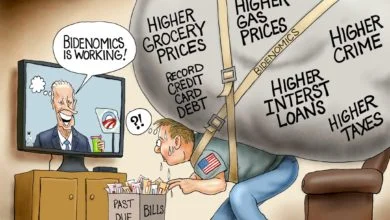Biden Hints He’s Planning to “Cancel” Student Debt. Here’s Why Student Debt Holders Should Be against the Move
The conversation around canceling student debt has been going on for years. Proponents say it will help people who are struggling financially, particularly young adults. Critics say it places an unfair burden on taxpayers for something they never signed up for. Thus far, the political stars have not aligned to make student debt “cancellation” a reality. But as of this week, there are signs that things may be about to change.
On Wednesday, Rep. Tony Cardenas (D-Calif.) recounted a discussion he had with President Biden on Monday. At first, he asked the President to extend the moratorium on student debt payments, which is set to expire on August 31. “He immediately smiled and said, “I’ve extended in the past, and you’re going to like what I do next,’” Cardenas said. “So I said, ‘Okay, wonderful. Next question.’”
Cardenas said he then asked about forgiving at least $10,000 in debt for each student, something Democratic leaders have long been asking Biden to do. “‘Yes, I’m exploring doing something on that front,’” was Biden’s response according to Cardenas. “And he also smiled and said, ‘You’re going to like what I do on that as well,’” Cardenas continued.
While we don’t know exactly what Biden’s intentions are, it’s clear he’s strongly considering a certain amount of student debt cancellation, a policy that would have a massive impact on the nation’s 43 million student debt holders. But while this may be welcome news to many, it’s important to remember that this is likely much more about politics than compassion.
Quite simply, Biden wants to look good to voters, especially coming up on an election, and promising to cancel a certain amount of their debt is a great way to do that. Senator Mitt Romney has gone so far as to call it vote bribing, which is honestly a pretty accurate description. Suffice it to say, it would be naive to think the Democrats are considering this purely out of concern for the welfare of student debt holders.
Desperate polls call for desperate measures: Dems consider forgiving trillions in student loans. Other bribe suggestions: Forgive auto loans? Forgive credit card debt? Forgive mortgages? And put a wealth tax on the super-rich to pay for it all. What could possibly go wrong?
— Mitt Romney (@MittRomney) April 27, 2022
The problem is, “forgiving” debt doesn’t make it go away, it just shifts the burden. These “loans” effectively become grants, and the taxpayers are left footing the bill. This is a classic example of concentrated benefits and dispersed costs. The winners, which are a relatively small group, get a very visible benefit. But the losers, which are a relatively large group, suffer a very invisible cost in the form of higher taxes.
The 19th century French economist Frédéric Bastiat called this kind of practice legal plunder. Whereas the law is supposed to uphold and protect property rights, he says, it is often weaponized to violate property rights.
“But how is this legal plunder to be identified?” Basiat asks in his book The Law. “Quite simply. See if the law takes from some persons what belongs to them, and gives it to other persons to whom it does not belong. See if the law benefits one citizen at the expense of another by doing what the citizen himself cannot do without committing a crime.”
Put simply, canceling student debt amounts to robbing Peter to pay Paul. It is giving one group an unearned handout by forcibly taking the money from another group.
But ethics aside, there’s also a practical reason why the people who stand to gain from this move should be against it. To be sure, they get a windfall in the short term. But in the long term, they will likely be net losers.
That is because legal plunder by one interest group tends to beget legal plunder by other interest groups, under the rationale that, as Bastiat put it, “since everyone else uses the law for his own profit, we also would like to use the law for our own profit.” This leads to what he called “universal legal plunder,” an economic “war of all against all” in which the plunderers inevitably become the plundered.
If a policy like student debt cancellation gets passed, it will set a strong precedent. Soon, it won’t just be students clamoring for debt forgiveness. Every special interest group under the sun will see an opportunity to benefit at the taxpayer’s expense. “If students can get a break,” they will say, “why not us?”
As a result, debt-forgiveness schemes like this will become increasingly commonplace. By moving forward with student debt cancellation, we are only moving further down the road toward a world where everything is a political chess match, where taxpayers are gouged more and more to buy the votes of special interest groups. Of course, it will never be called that. It will always be done in the name of welfare. But that’s what it will be.
The problem is, one day you will be the federal taxpayer, and someone else will be the beneficiary of your tax dollars. You might be part of the favored special interest group today, but do you really think you’ll always be in that small minority of winners?
Remember, these schemes are built on concentrated benefits and dispersed costs. There’s a small group of people that get the benefit, and the vast majority are on the losing end. So if we end up with a system like this, where taxpayer dollars are regularly used to help special interests, it’s far more likely that over your lifetime you will be a net payer than a net beneficiary. You might win in the short term, but you will lose in the long term.
Given this reality, it’s in your own self interest to oppose these kinds of measures, even if you stand to win in the short run. It may be expedient to push for student debt forgiveness, but it’s signing up for a game that you will most likely lose.
Bastiat once said “government is that great fiction by which everyone tries to live at the expense of everyone else.” What happens in practice, of course, is that a small minority lives at the expense of everyone else. And I wouldn’t bet on being one of the lucky few.
Content syndicated from Fee.org (FEE) under Creative Commons license.
Agree/Disagree with the author(s)? Let them know in the comments below and be heard by 10’s of thousands of CDN readers each day!





Student Loans have destroyed our higher education system. Students no longer have to face the impact of various options of study. worse, schools of higher education no longer have to provide their basic mission-prepare students to perform well in the real world. Instead, they have been able to increase their prices and add programs and activities that bring in revenue but do not contribute to student success in the real world. When my sister and I attended college many years ago we had a basic mission – get an education that would prepare us for a better life than what our parents (youth of the depression) had. We worked, our parents sacrificed. We took classes that prepared us for as career and we spent our spare time serving in school activities learning how to be successful in the real world. Maybe the careers of today are different but the basic purpose of higher education should still be to prepare young people to face the world. Our colleges need to get back to basics and our students need to learn the real economics of the value of a college degree.